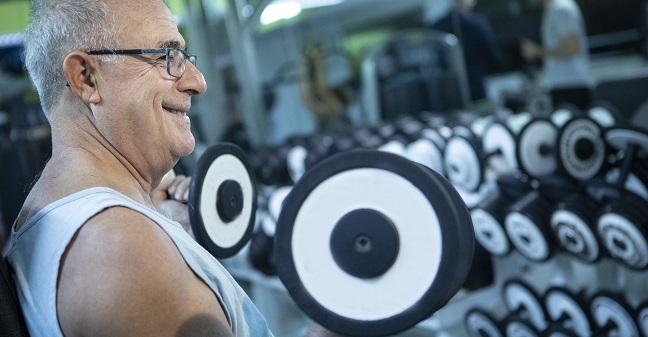Exercise Outdoes Testosterone at Improving Vascular Function
A small randomized trial showed that the two options didn’t produce additive benefits for cardiovascular health.

Middle-age and older men with large waist circumferences and low/normal testosterone levels don’t gain better vascular health when using cream to replace the hormone, but they do stand to benefit from a supervised exercise program, new data suggest.
This, along with a growing body of literature, flies in the face of the notion that testosterone therapy “is a restorative hormone that preserves health,” Lauren C. Chasland, BSc (The University of Western Australia, Perth), and colleagues say. In 2015, the US Food and Drug Administration issued a safety communication urging caution when it comes to testosterone, only to be followed by more studies suggesting the potential for harm, even when use is indicated.
For this analysis, published online recently in Hypertension, the investigators had hypothesized that testosterone and exercise might, through dual mechanisms, have an additive, positive effect on vascular function. “[E]xercise training primarily upregulates the endothelium, and some evidence suggests testosterone treatment enhances vascular smooth muscle function in men with coronary artery disease,” they explain.
To their surprise, co-author Bu B. Yeap, MBBS, PhD (The University of Western Australia), told TCTMD, this wasn’t the case. “We had expected men receiving both testosterone treatment and exercise training to have the largest improvement in vascular function,” he said. “Instead, we found that while exercise training improved vascular function, testosterone treatment did not, nor did testosterone enhance the effect of exercise training.”
Michael Emery, MD (Cleveland Clinic, OH), said the question was an interesting one. Importantly, “they didn’t look at men that were truly pathologically hypogonadal,” he noted to TCTMD. “They looked at this sort of ‘gray zone’ of low/normal testosterone in older men, which is this huge target [for advertising].”
The takeaway, for Emery, is clear: “Yet again, exercise beats anything you can slather on yourself or take a pill for.”
Yet again, exercise beats anything you can slather on yourself or take a pill for. Michael Emery
The 12-week study enrolled 80 men ages 50 to 75 years who had waists measuring ≥ 95 cm and serum testosterone levels of 6 to 14 nmol/L. In a 2x2 factorial design, participants were randomized to transdermal AndroForte5 (testosterone 5.0% w/v, 100 mg/2 mL) or matching placebo and to supervised exercise (aerobic and strength, two to three times weekly) or no additional exercise. Current smokers and men already on testosterone or medications affecting testosterone level were excluded.
Self-reported testosterone adherence was 97.6%, and 96.5% of those assigned to exercise attended at least twice weekly. Hormone therapy increased serum testosterone levels, such that 62% of those receiving it had levels greater than 14 nmol/L, compared with 29% of those receiving placebo.
In terms of risk factors, neither testosterone nor exercise differentially affected body mass index, weight, waist circumference, glucose level, or HDL level. Hemoglobin A1c decreased slightly in both testosterone groups (ie, with or without exercise). Total cholesterol dropped with testosterone plus exercise but increased with testosterone alone. The hormone increased systolic BP, a difference the researchers attribute to a decrease in the placebo groups. Testosterone also was linked to increases in diastolic BP. With exercise, resting heart rate was reduced.
Data on vascular outcomes were available for 78 people. Flow-mediated dilation (FMD) rose with added exercise (P = 0.003) but not with testosterone versus placebo (P = 0.111). Neither option affected response to glyceryl trinitrate.
Mean FMD by Study Arm
|
|
Testosterone + Exercise (n = 21) |
Testosterone (n = 18) |
Exercise (n = 19) |
Neither (n = 20) |
|
Week 0 |
2.7% |
4.1% |
3.6% |
3.2% |
|
Week 12 |
3.2% |
3.4% |
4.6% |
3.4% |
Yeap said the gains seen here with exercise are likely to be significant. As to what physicians should tell their patients, he said the main message is that “if men want to improve the health of their arteries, exercise (provided there are no medical concerns or physical limitations) would be the way to do it. Testosterone does not appear to improve vascular function, at least over a 12-week period of time.” In their paper, the authors go a step further, advising that “caution should be applied when prescribing testosterone if the primary aim is improvement in artery function and health.”
The group hopes to do a larger, lengthier study looking at other measures of heart health, Yeap said. “The important question remains: what is the effect of testosterone treatment on the coronary arteries and the heart?”
Emery pointed out that, while the observed effects of exercise training on endothelial function were small, this may be because the program involved what “appears to be moderate-intensity exercise below the current recommended levels” of 150 minutes weekly.
“What I see is that exercise continues to win,” he concluded, adding “any amount of getting off the couch and moving improves cardiovascular outcomes.”
Caitlin E. Cox is Executive Editor of TCTMD and Associate Director, Editorial Content at the Cardiovascular Research Foundation. She produces the…
Read Full BioSources
Chasland LC, Naylor LH, Yeap BB, et al. Testosterone and exercise in middle-to-older aged men: combined and independent effects on vascular function. Hypertension. 2021;Epub ahead of print.
Disclosures
- This research was funded by a grant from the Heart Foundation of Australia. Supplementary research funding was received from Lawley Pharmaceuticals, Western Australia, which provided active medication and placebo for the study.
- Chasland was supported by an Australian Postgraduate Award and a REDiMED PhD Top-Up scholarship.
- Yeap has received speaker honoraria and conference support from Bayer, Lilly, and Besins Healthcare as well as research support from Bayer, Lilly, and Lawley Pharmaceuticals, and he has participated in advisory roles for Lilly, Besins Healthcare, Ferring, and Lawley Pharmaceuticals.
- Emery reports no relevant conflicts of interest.





Comments